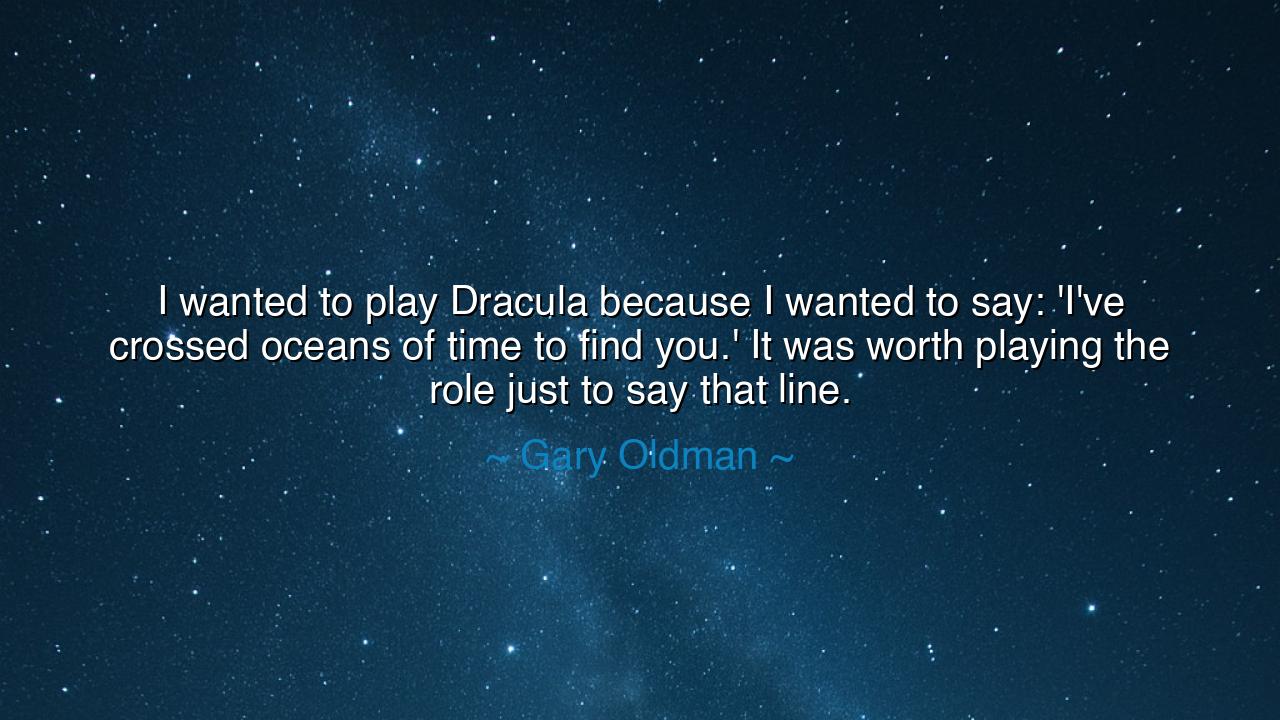
I wanted to play Dracula because I wanted to say: 'I've crossed
I wanted to play Dracula because I wanted to say: 'I've crossed oceans of time to find you.' It was worth playing the role just to say that line.






The words of Gary Oldman—“I wanted to play Dracula because I wanted to say: ‘I’ve crossed oceans of time to find you.’ It was worth playing the role just to say that line.”—are not merely the musings of an actor, but the recognition of the timeless power of love, devotion, and destiny. The line he cherished burns with a mythic fire, for it speaks of a longing so great, a bond so unbreakable, that neither distance, nor centuries, nor even death itself can sever it. To cross oceans of time is to defy the limits of mortality, to proclaim that love is stronger than the frailty of years.
The ancients themselves would have understood this yearning well. In Homer’s Odyssey, Odysseus roams across seas and through the trials of gods, yet at the heart of his wanderings is not conquest, but return—return to Penelope, his faithful love. Ten years of war, ten years of wandering, yet his heart remained fixed upon her. The oceans he crossed were not only of water, but of time, hardship, and longing. In this sense, Oldman’s chosen line is not simply about Dracula; it is about the eternal human truth that love is the one force that dares to claim victory over time.
Yet there is another layer to Oldman’s quote: the yearning of the artist himself. For what is an actor but one who too crosses oceans of time, inhabiting the voices and lives of others long gone or yet imagined? By speaking the line, Oldman was not only embodying a role, but touching the heart of all who have ever felt the ache of longing across distance. In that moment, he was not merely playing Dracula—he was giving voice to the universal cry of love that endures, suffers, and waits.
History gives us real examples of this devotion. Consider the love letters of Abelard and Héloïse, two souls torn apart by circumstance, punishment, and the harshness of their age. Though separated by cloisters and vows, their words crossed the chasm of time, carrying their hearts to one another in defiance of silence and separation. Like Dracula’s cry, their letters declared: “Though fate has divided us, my love has not withered; I will cross the years to reach you.” Their story shows us that time cannot kill true affection, but instead tests it, deepens it, and proves it worthy.
Beloved listener, hear the wisdom: in our lives, we too are called to cross oceans of time for what we love. Whether it is for a person, a calling, or a dream, we must endure the hardships of delay, the disappointments of waiting, the struggles that make the journey long. For nothing of true worth is gained swiftly. Love, purpose, and legacy all demand patience, sacrifice, and the willingness to endure the passing years without surrendering the heart’s flame.
The lesson is clear: do not measure the value of love or purpose by ease or immediacy. If the journey is long, rejoice, for it proves that what you seek is worth enduring for. If time tests you, endure, for in endurance lies the proof of true devotion. Whether it is the devotion of an artist to his craft, a lover to his beloved, or a soul to its calling, the words “I’ve crossed oceans of time to find you” remind us that what is eternal is always worth waiting, striving, and suffering for.
So let Oldman’s cherished line be more than cinema—it is a reminder of what it means to live greatly. Love deeply, endure patiently, pursue faithfully, and let no measure of time dissuade you from what you know is true. For when you stand at the end of your journey, able to say, “I have crossed oceans of time,” you will know that your life was not lived in vain, but in the pursuit of something eternal.






AAdministratorAdministrator
Welcome, honored guests. Please leave a comment, we will respond soon